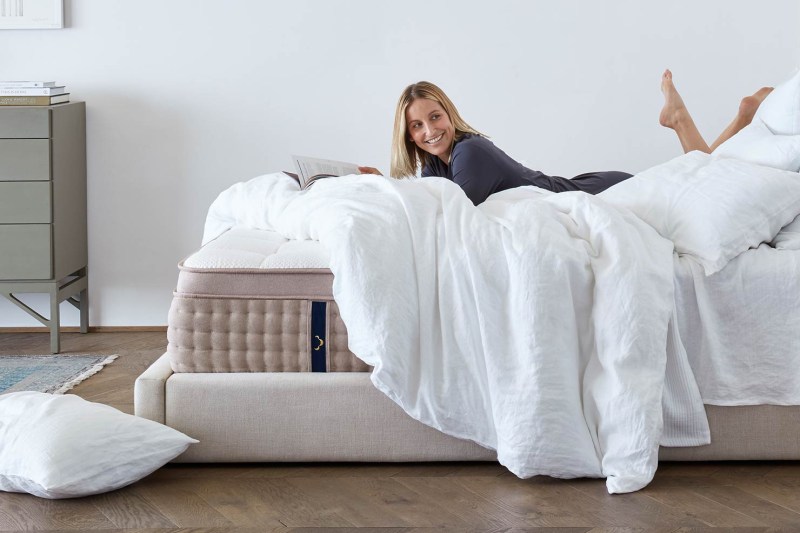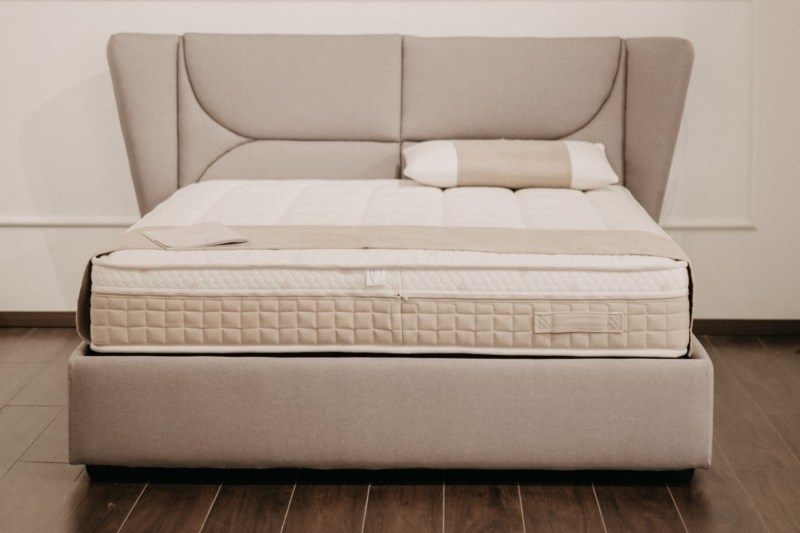A good night’s sleep is essential to living a healthy life. In fact, studies have shown that sleep deprivation can lead to everything from irritability and lack of focus to increased risk of stroke, depression, and even diabetes. Of course, there are many factors that affect your quality of sleep, and the chief among them is your mattress and bedding.
Dr. Michael J. Breus, Ph.D.: Dr. Michael J. Breus is a clinical psychologist, a Fellow at the American Academy of Sleep Medicine, and a Diplomate of the American Board of Sleep Medicine. He also appears regularly on The Dr. Oz Show, CNN, The Doctors, and CBS This Morning and contributes to Huffington Post and Psychology Today, among other publications. Breus is the author of three best-selling books: Good Night: The Sleep Doctor’s 4-Week Program to Better Sleep and Better Health, The Sleep Doctor’s Diet Plan: Lose Weight Through Better Sleep, and The Power of When: Discover your Chronotype.

It’s difficult to sleep well on an old or uncomfortable mattress. Given that they are the foundation for a solid night of slumber, we started wondering which exactly were the best mattresses on the market these days. As part of our hunt, we decided to seek out the advice of a few health professionals: two chiropractors, and a psychologist who specializes in sleep disorders.
All three of our experts agree that, when it comes to getting a new mattress, the two most important factors to consider are comfort and support. As Dr. Breus immediately asserts, “The goal is to provide your body with sufficient support to bring the spine into alignment and allow your muscles to relax during sleep.” In other words, as Dr. Hayden explains, “A mattress should be firm enough to support the skeleton and soft enough to be truly comfortable.”
Dr. Robert Hayden, DC, Ph.D.: Dr. Robert Hayden maintains a private practice in Griffin, Georgia. Hayden is a past president of the Georgia Chiropractic Association and was named the organization’s “Chiropractor of the Year” in 2006. Prior to receiving his doctor of chiropractic degree, Dr. Hayden was a cardiovascular clinical nurse specialist, devoting 18 years to the nursing profession and serving as executive director of the Mississippi Nurses’ Association. Hayden holds bachelor’s degrees in chemistry and nursing and received his master’s degree in nursing from the University of Alabama. He also holds a Ph.D. from the University of Mississippi and, in 1995, received his doctor of chiropractic degree from Life University.
Of course, comfort is wholly subjective. Some people love a mattress that’s as firm as a rock, while others can only sleep on an extremely plush bed. You should also keep in mind that your preferences can alter over time. You may find that if you gain or lose weight, you favor different levels of firmness or softness. Your tastes are also likely to evolve as you age.
Conversely, support is both objective and critical. “A mattress that … does not support the skeleton properly will create stress on joints in the spine, sacroiliac joints, the neck, and possibly even the knees. When this results in chronic or recurrent pain, we hear from patients,” Dr. Hayden says.
Dr. Breus also reminds us that “firmness does not [necessarily] equal support.” Indeed, a “well-constructed mattress[es] made with high-quality materials” can provide what you need, no matter whether they are super-firm or super-soft. Moreover, he cautions that “not every individual needs the same level of support.” Ultimately, he says you are looking for a new mattress that “lets your muscles relax,” “allows relief and comfort at pressure points, including the knees, hips, shoulders, and head” and one that won’t “sink at the hips.”
Dr. Christopher M. Piering: Dr. Christopher M. Piering is a 1984 graduate of Palmer College of Chiropractic. He has been in continuous practice in the New York area and upstate New York. He currently lives in Syracuse, New York, and runs the Camillus Chiropractic Office.
Another facet you must consider is sleep position. Dr. Piering shares, “Most of us move around a lot more than we think during the night and change positions frequently. [In fact, it] is estimated that the average person changes position 35 to 40 times during a normal night’s sleep.” He also notes that if you’re a side sleeper, “then a mattress that allows for significant deformation is important to [ensure] the contours of your body [are] supported. Sleeping on your back is also [often] a preferred position and requires the proper choice of pillow to allow support for your neck and upper back.”
So how do you ultimately know when it’s time for you to replace your mattress? Well, according to Dr. Breus, the lifespan of a mattress is typically seven to eight years. However, that’s not a hard and fast rule. You should also pay attention to how you feel during the night and the following morning. As Dr. Breus says, “Your body will tell you when it’s time for your old mattress to go. If you’re experiencing pain and stiffness regularly — three to four times a week on a routine basis — it’s time to start looking for a new mattress.”
The yardstick test: If you notice significant depressions or are able to safely stick your hand under the yardstick without disturbing it, the mattress likely no longer provides the proper support.
Additionally, both Dr. Hayden and Dr. Piering recommend using the “yardstick” test. This entails taking the aforementioned yardstick (or any rigid object) and laying it across your mattress. If you notice significant depressions, or if you can safely stick your hand under the yardstick without disturbing it, the mattress likely no longer provides the proper support. Dr. Piering also quickly adds that if you spend a night away from home and wake up feeling significantly better than you normally do, that’s another indication that it’s perhaps time to go mattress shopping.
Types of Mattresses

Before you head out, it’s important to recognize the various types that are available. The standard options are as follows:
Memory Foam
Memory foam mattresses are designed to mold to your body shape and reduce the feeling/effect of movement. However, they can sometimes generate more heat than other mattress types.
Innerspring
The oldest and most traditional option, innerspring mattresses use coils to provide support while you sleep. They also allow you to move/change your sleep position with ease. On the other hand, innerspring mattresses don’t contour as well and aren’t always hypoallergenic.
Latex
Often made from plant or petroleum-based materials, latex mattresses tend to be eco-friendly. Perhaps more critically, they offer a good deal of support and will help keep pressure off your shoulders and hips. Latex mattresses also excel at suppressing motion.
Adjustable Air
Once the provenance of outdoor enthusiasts and overnight guests, air mattresses have slowly made their way into the bedroom. And their big benefit? You can customize your sleep experience by adjusting the firmness of the mattress. This is especially useful for couples with varying preferences. Unfortunately, air mattresses tend to be on the pricier side.
Water
Although waterbeds have declined in popularity over the years, they are still readily available. The water itself makes the mattress great for contouring. If you’re worried that the wave motion will be a little too much, you can always opt for a model that reduces the water’s ability to flow. The downside of waterbeds is that they can leak over time and may require maintenance/upkeep.
The Best Mattresses
Once you’re ready to hit the stores, our experts urge you to take your time. As Dr. Piering notes, “There are many good mattresses in [various] types across a wide price range that can meet an individual’s needs and this investment should be chosen wisely.” Dr. Breus suggests that, if possible, go shopping toward the end of the day. You’re more likely to be tired so your body will be in a state that somewhat resembles your actual bedtime. Additionally, wear loose-fitting clothes and bring your spouse/partner. You both need to find the mattress comfortable after all.
When actually testing a bed, Dr. Breus recommends you lie down in your starting sleep position for roughly 7-10 minutes. As he explains, “When you move from a standing to a recumbent position, your body needs some time to recalibrate and your heart rate to slow down as you relax toward a state similar to when you actually go to sleep.” Once that initial time period is up, he says you should then move to your second most common sleep position for another 7-10 minutes. Repeat this process for every new mattress you consider. Then you can have full confidence in your final decision.
After taking the info and advice from our health experts under advisement, these are our top mattress selections:
We wish you good luck with your search and sweet dreams post-purchase. In case you need more help in building the perfect bed, here are some sweet deals on our favorite pillows and bedding bundles.




